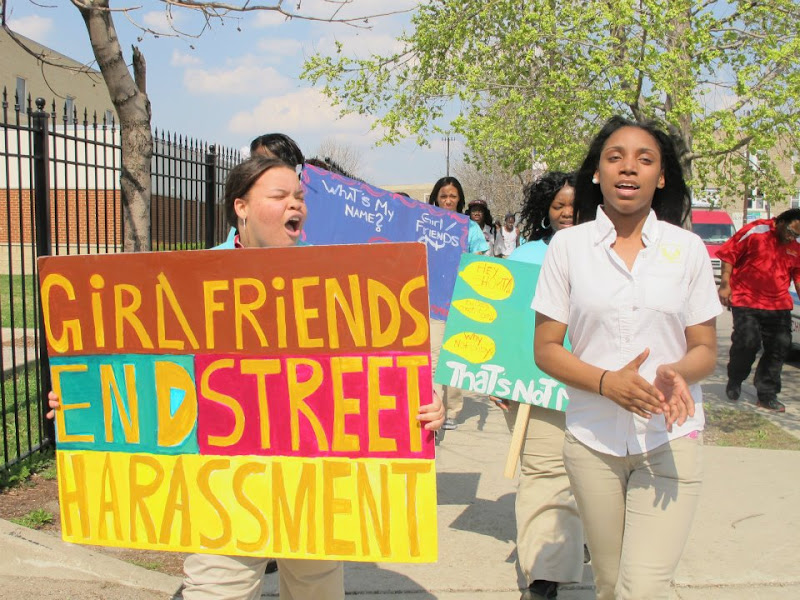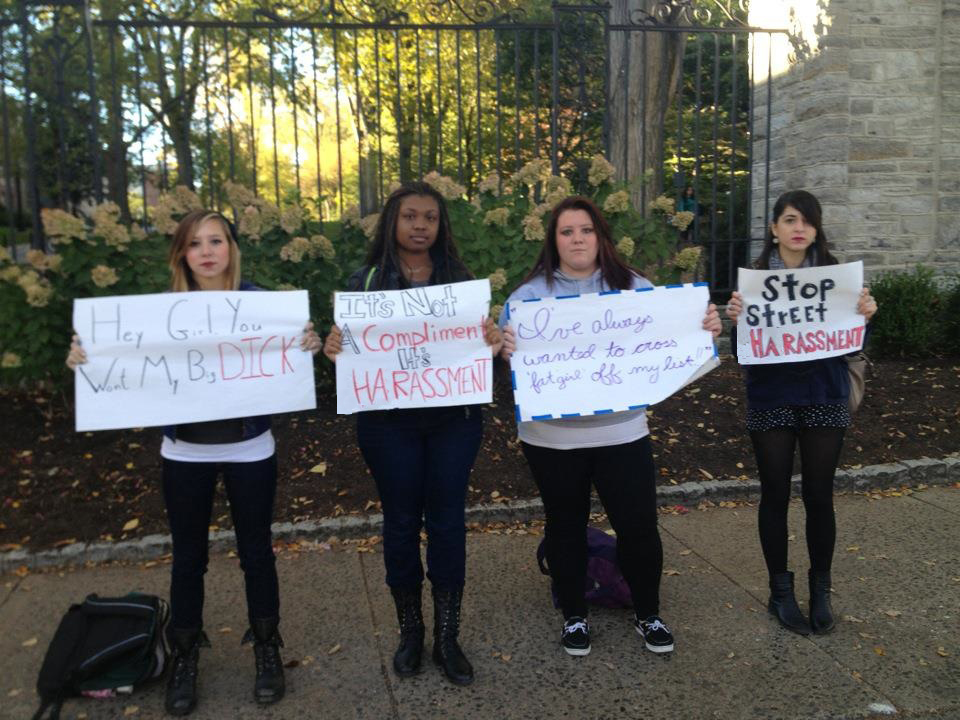At the end of every year, I like to look back, document and reflect on everything that has transpired in the global movement to end street harassment and assault. Yesterday I wrote about 10 of Stop Street Harassment’s achievements. Today, I’m posting a five-part series about the highlights of ALL activism that happened this year (PDF format). WHAT A YEAR!
Post 1 (this one): New anti-street harassment campaigns, new initiatives within existing campaigns, and protests.
Post 2: Creative anti-street harassment initiatives.
Post 3: Government initiatives/collaborations
Post 4: New studies, reports, and significant news articles.
Post 5 : Stories from 25 people who stood up to street harassers this year.

1. Global: In March, Stop Street Harassment organized more than 100 groups in more than 20 countries (on five continents) and tens of thousands of people to collectively speak out against street harassment during Meet Us on the Street: International Anti-Street Harassment Week. This is what happened, including rallies, marches, sidewalk chalk messaging, workshops, film screenings, viral videos, safety audits, report releases, street theater, passing out fliers, art exhibits, and more.
2. Global: Hollaback! now has chapters in 60 cities worldwide, and this year they launched an “I’ve Got Your Back” Bystander Campaign in partnership with Green Dot to show bystanders who to intervene, educate them about their options, and allow them to document their successes online. Green dots on the Hollaback! maps show intervention stories. (Read their State of the Streets 2012 report for more information.)
3. Australia: People Against Street Harassment launched in December. Their mission is “confronting street harassment in Sydney via stickering, leafleting, social media and other such sweet guerilla action.”
 4. Australia: Cat Calls: Called Out is another new Sydney-based anti-street harassment campaign that works to bring attention to the issue and spread ideas for stopping it.
4. Australia: Cat Calls: Called Out is another new Sydney-based anti-street harassment campaign that works to bring attention to the issue and spread ideas for stopping it.
5. Belgium: In the fall, ELLE launched a Touche Pas à Ma Pote! (Don’t Touch my Girl friend) campaign with the support of local government agencies in Brussels and it includes signs plastered on trams for the next six months.
6. Canada: Women in Cities International is part-way through a multi-year project to conduct a Blueprint project on the theme of “preventing violence against women and girls and improving their security in Canadian cities.” This year, they worked with adolescent girls in the greater Montréal area and held workshops, focus group discussions and training sessions with them. Participants also conducted women’s safety audit walks and they had the opportunity to creatively illustrate their findings and recommendations.
7. Egypt: HarassMap collects street harassment stories on its online map. During 2012, they organized more than 500 HarassMap volunteers who went outside once per month to talk to shop owners, police, doormen and others with a presence in the street about street harassment and to let them know they need to not harass and to stand up if they see harassment happening.
8. Egypt: On June 13, activists in Egypt led a day of online action to speak out against street harassment and sexual violence using the hashtag #EndSH.
9. Egypt: After several mass sexual assaults of women at Tahrir Square and after a woman was murdered by a street harasser, there were numerous protests in the summer and fall (and one protest ended because men swarmed, attacking the protesters).

10. Egypt: There were many campaigns against street harassment in Egypt ahead of the Eid holidays. In August, volunteers organized by the Imprint Movement patrolled the streets and subway stations, watching out for harassers and helped police arrest several. In October there was a “Catch a Harasser” initiative, men spray painting harassers, and special harassment reporting hotlines.
11. Egypt: Because there are so many instances of sexual harassment and sexual assault during political protests in Tahrir Square, during political protests in November and December, people volunteered their time to serve as patrollers, working to make the area safe for women. One of the groups is called Tahrir Bodyguard.
12. India: College students in Mumbai organized a Chal Hatt Tharki campaign asking women to raise their voices against sexual harassment and street harassment.
13. India: In April, thousands of women in Kannur, a district in Kerala, gathered in the city center to ask for the right to travel safely at night and in October in Chandigarh, college students and staff of Government College Sec 42 took to streets to protest street harassment and sexual violence.
14. India: In December, the Patiala-based organization Punjab Today Foundation launched a major awareness movement against what it called the “collective guilt of society” against girls and women called SMASH (Society’s Movement Against Street Harassment).
15. India: The organization Breakthrough launched a bystander campaign for the holiday Diwali in November, because everyone deserves a safe Diwali.
16. India: In July, Blank Noise curated a series of stories about people’s first recollection of experiencing street harassment called Recall. In December, they launched the #SafeCityPledge campaign.

17. India: After a 23-year-old college woman was brutally gang rape and nearly murdered by six men on a bus (and her male friend was also beaten up by them) in mid-December, tens of thousands of people in Delhi have protested and marched daily, calling for an end to street harassment, rape, and all forms of sexual violence. For a time, they clashed with police who forbad people from gathering in groups larger than five people.
18. Jordan: In July, youth in Jordan formed a human chain from Al Hussein Sports City to the Interior Ministry Circle to protest various gender-based crimes, including street harassment, the practice of forcing rape survivors to marry their rapist, and honor killings.
19. Lebanon: Hundreds of people rallied in Beirut, Lebanon, in January to protest rape and sexual harassment and the weak laws against such crimes. The rally was organized by Nasawiya, a feminist collective that also runs The Adventures of Salwa campaign against street and sexual harassment.
20. Myanmar: In February, a new anti-harassment campaign launched called “whistle for help.” As part of the campaign 150 volunteers distributed whistles and pamphlets to women at eight busy bus stops in Yangon each Tuesday morning that month and they’ve continued to do so for nine months. The pamphlets tell women to blow the whistle when they experience sexual harassment on the bus and advises them to help other women when they blow the whistle.
21. Malawi: Women’s groups organized a protest in January, demanding the right to wear pants and mini-skirts and to demanding an end to sexual violence. Their actions were prompted by a series of attacks from gangs of men who targeted women wearing pants and short skirts.
22. Nepal: In April, 500 youth participated in a Walk for Respect against street harassment/sexual harassment in Kathmandu.
23. Nepal: After a 2011 ActionAid Report showed that street harassment is a big problem in Nepal, numerous groups came together to launch the Safe City Nepal campaign. It includes a public transportation component. Already, they have conducted a safety audit (evidence collection), held forums, and are now working on policy advocacy initiatives.
 24. Peru: In February, university faculty and students launched the anti-street harassment initiative el Observatorio Virtual contra el Acoso Sexual Callejero. They have 20 volunteers who conduct interview and research on the topic, share information on their website and social media, meet with government officials, engage in awareness campaigns, and speak out against groups/people who dismiss street harassment (e.g. in September a radio show talked about street harassment as compliments and they protested it, issued a statement, etc).
24. Peru: In February, university faculty and students launched the anti-street harassment initiative el Observatorio Virtual contra el Acoso Sexual Callejero. They have 20 volunteers who conduct interview and research on the topic, share information on their website and social media, meet with government officials, engage in awareness campaigns, and speak out against groups/people who dismiss street harassment (e.g. in September a radio show talked about street harassment as compliments and they protested it, issued a statement, etc).
25. Russia: This year the feminist group RosNahal tackled street harassment. They made a video about it (it has over two million views) and engaged in lobbying and activism that has led the Russian government to take notice.
26. Sri Lanka: Sri Lanka Unites organized the “S.H.O.W You Care” project. After receiving training, hundreds of young men boarded more than 1000 buses across a week and, according to a previously formulated strategic plan, apologized to women in the buses for any harassment they encountered in the past and provided them with information on legal recourse available to them. They also told men to take responsibility and not harass.
27. South Africa: After two teenagers wearing miniskirts were harassed and groped by a group of 50-60 men at a taxi rank, around 3,000 South Africans marched through Johannesburg in protest. The ruling African National Congress Women’s League organized the march to emphasize “that women had the right wear whatever they wanted without fear of victimization.”
28. South Africa: A new campaign against street harassment in Cape Town launched this year.
29. UK: Laura Bates launched the Everyday Sexism Project in the spring, in part because of her own street harassment experiences and other ways she faces daily sexism. In September she wrote, “The project is an ever-increasing collection of thousands of stories of sexism experienced by women around the world. In just over 5 months, the project has received nearly 6500 entries, with the last 5000 flooding in in just the last month as the momentum has gathered and word has spread.”
30. USA: Halloween in Isla Vista, the college town where University of California Santa Barbara is located, is a huge party every year. Unfortunately, some people use this as an excuse to street harass and assault people. In October, two student groups teamed up to organize a campaign against street harassment.
 31. USA: Members of Penn State’s TRIOTA, the Women’s Studies Honor’s Society, held an anti-street harassment demonstration on a busy Friday afternoon in downtown State College in October. They held signs proclaiming their anti-harassment message, and even included specific remarks that had been yelled at them during their time at PSU.
31. USA: Members of Penn State’s TRIOTA, the Women’s Studies Honor’s Society, held an anti-street harassment demonstration on a busy Friday afternoon in downtown State College in October. They held signs proclaiming their anti-harassment message, and even included specific remarks that had been yelled at them during their time at PSU.
32. USA: In March, Sarah Harper launched the Little Bird project to raise awareness about street harassment through the arts in San Francisco, California.
33. USA: Since January 1, 2012, at least 63 transgender individuals have been hatefully murdered, often by strangers in the streets, and many of the recent murders have been in Washington, DC. In September the DC Office of Human Rights launched a groundbreaking Transgender and Gender Identity Respect Campaign to improve the treatment of transgender and gender non-conforming people.
34. Yemen: This year, the Safe Streets campaign has encouraged women to report their stories to their website and highlighted the issue through social media and articles like this one, published on Open Democracy.

